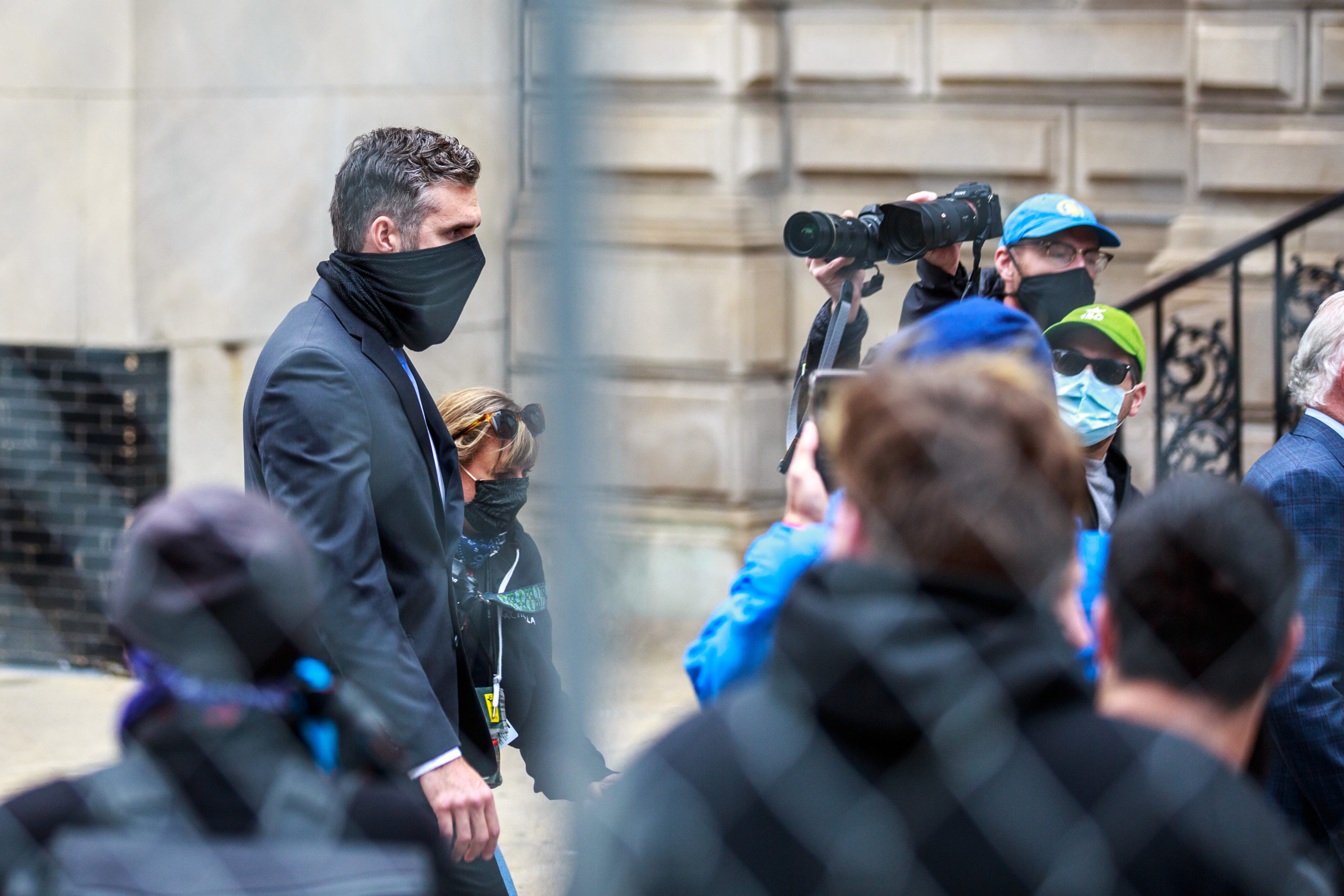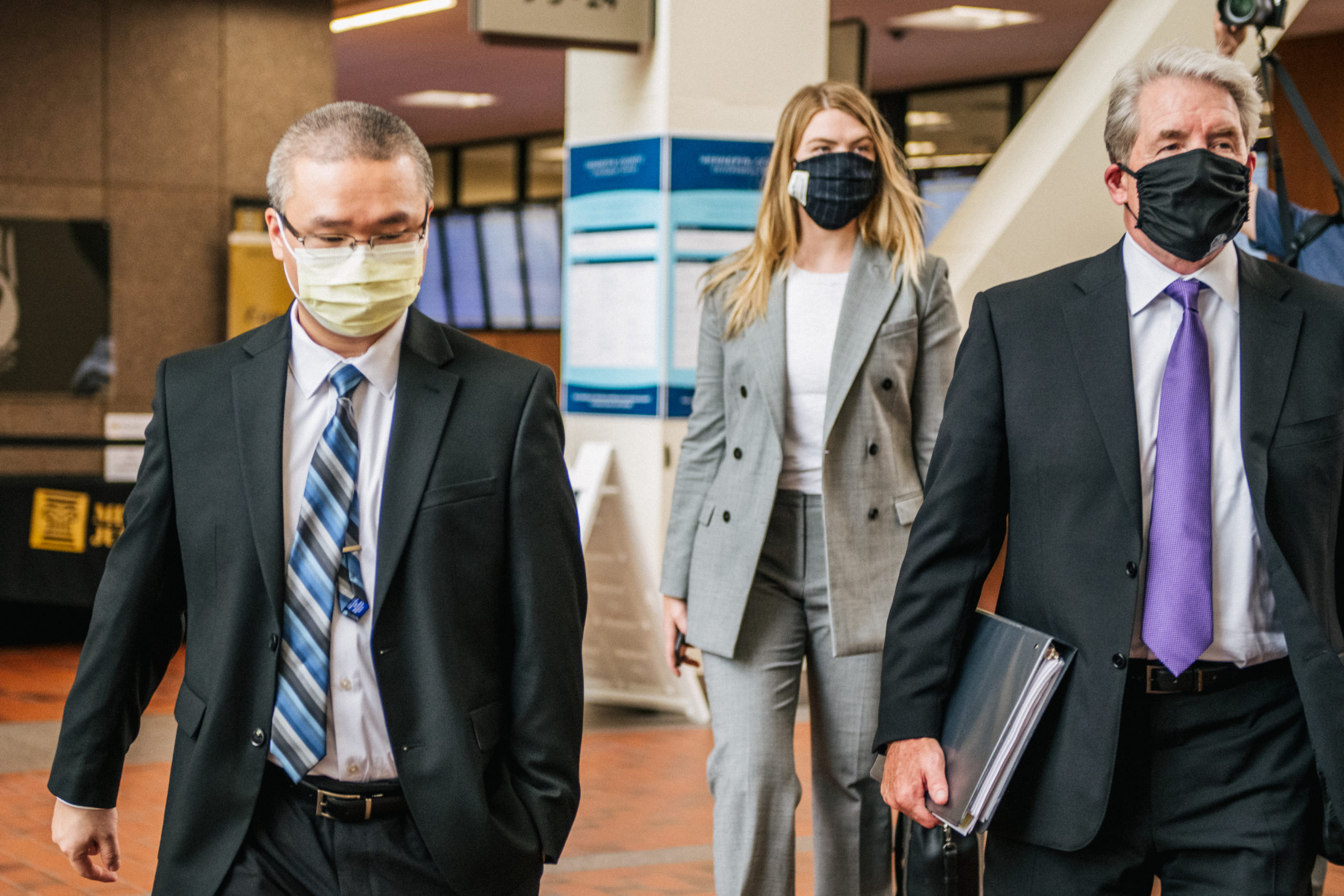A judge declined the request of defense attorneys in the George Floyd case to move the trial out of Minneapolis, and also ruled that the four former officers would be tried in a single proceeding, numerous sources reported.
Hennepin County Judge Peter Cahill had warned attorneys and public officials months prior that if they don’t stop making public statements about the Floyd case, he would move the trial out of the county. After the former officers’ defense attorneys argued that pretrial publicity had made it impossible for them to get a fair trial, Cahill ultimately declined the request, but said he would revisit it if needed, according to the Associated Press.

Former Minneapolis Police officer Thomas Lane is seen leaving after a court hearing on the murder of George Floyd at the Hennepin County Family Justice Center in Minneapolis, Minnesota on September 11, 2020. (Photo by Kerem Yucel / AFP) (Photo by KEREM YUCEL/AFP via Getty Images)
Defense attorneys had also cited a September hearing, when protesters confronted the former officers outside of a courthouse. The attorneys argued that keeping the trial in the area where Floyd died was a potential safety risk for participants, and that witnesses and jurors could be intimidated.
The case has received significant media coverage — and Cahill expressed his concerns following the second pretrial hearing for the four defendants in June.
“The court is not going to be happy about hearing about the case in three areas: media, evidence and guilt or innocence,” Cahill said. (RELATED: Judge Threatens To Move George Floyd Case Out Of County If Officials And Attorneys Keep Making Statements)
Change-of-venue motions are sometimes issued when there’s a reasonable likelihood that a defendant cannot receive a fair trial in the original venue. Pretrial publicity is often the reason for venue change if the publicity makes it difficult to find an impartial jury, according to Nolo.
Moving the trial from Minneapolis to other areas of the state with less diversity would likely affect the makeup of the jury, according to the AP.
Cahill also rejected the defense attorneys’ request that their clients face separate trials, saying the complications of separate trials were too great and that trying the four former officers together would “ensure that the jury understands . . . all of the evidence and the complete picture of Floyd’s death,” according to the AP.
By arranging separate trials, the attorneys had hoped to distinguish each officer’s role in Floyd’s death, the AP reported. The former officers began to shift blame away from themselves, diminishing their alleged roles in Floyd’s death in hopes of lessening — or dismissing — the charges against them.
![Former Minneapolis police officers (clockwise from top left) Derek Chauvin, Tou Thao, Thomas Lane and J. Alexander Kueng poses in a combination of booking photographs from the Minnesota Department of Corrections and Hennepin County Jail in Minneapolis, Minnesota, U.S. [Minnesota Department of Corrections and Hennepin County Sheriff's Office/Handout via REUTERS]](https://cdn01.dailycaller.com/wp-content/uploads/2020/06/RTS3AIKW.jpg)
Former Minneapolis police officers (clockwise from top left) Derek Chauvin, Tou Thao, Thomas Lane and J. Alexander Kueng poses in a combination of booking photographs from the Minnesota Department of Corrections and Hennepin County Jail in Minneapolis, Minnesota, U.S. [Minnesota Department of Corrections and Hennepin County Sheriff’s Office/Handout via REUTERS]
Thou’s defense attorney Robert Paule argued that the State has the burden of showing that Thao “knew former officer Derek Chauvin and others were going to commit a crime and … intended his presence or actions to further the commission of that crime,” KARE 11 reported, which would establish probable cause.
Earlier that month, Lane’s attorney Earl Gray argued that there isn’t probable cause to charge his client and that Lane had asked if officers should roll Floyd on his side after suspecting Floyd was “on something” while reportedly acting erratically, and Chauvin responded no.

MINNEAPOLIS, MN – JULY 21: Former Minneapolis Police officer Tou Thao (L) and his attorney Earl Gray exit the Hennepin County Government Center, after a courthouse appearance, on July 21, 2020 in Minneapolis, Minnesota. (Photo by Brandon Bell/Getty Images)
Floyd died after Chauvin knelt on his neck for several minutes on May 25. Chauvin is charged with second-degree murder, third-degree murder and manslaughter.
Gray also claimed that from the start, Lane demanded to see Floyd’s hands at least 10 times while Floyd was in his car. Lane drew his gun after it appeared Floyd was reaching for something, but holstered it when Floyd showed his hands. (RELATED: Attorney Of One Officer In George Floyd Case Seeks Case Dismissal Due To Lack Of Probable Cause)
“The decision to restrain Floyd was reasonably justified,” Gray wrote, according to the AP. . “Based on Floyd’s actions up to this point, the officers had no idea what he would do next – hurt himself, hurt the officers, flee, or anything else, but he was not cooperating.”


